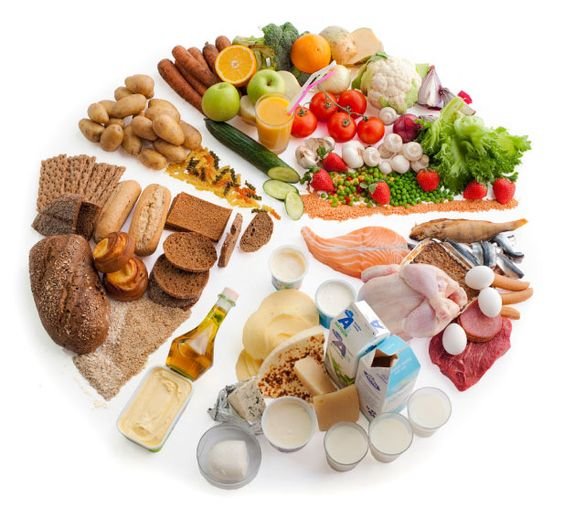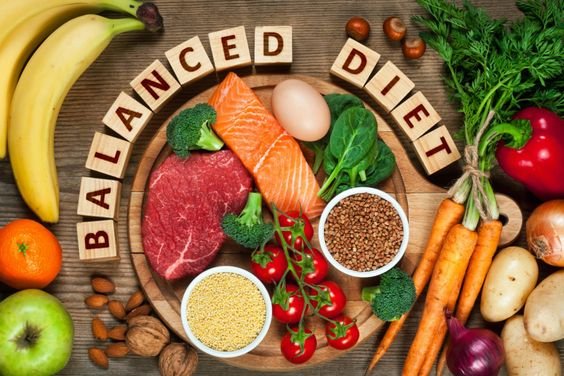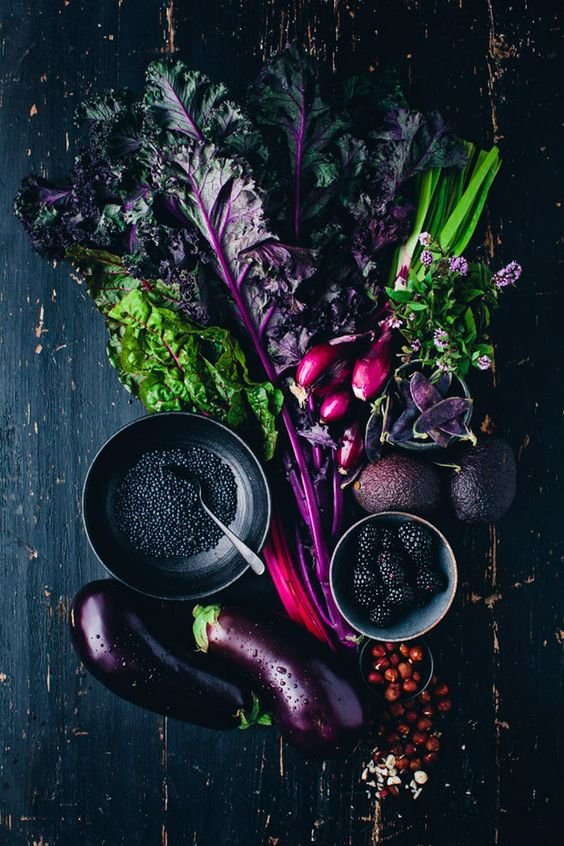
7 Healthy Nutrition Tips for Everyday Energy
Nutrition is the science of how food fuels and supports our bodies. It involves understanding nutrients—like carbohydrates, proteins, fats, vitamins, and minerals—that are vital for energy, growth, and overall health. These nutrients help repair tissues, support immunity, and regulate body functions.
To feel energized and stay healthy, it’s important to follow 7 healthy nutrition tips for everyday energy, such as eating balanced meals, staying hydrated, and choosing whole, nutrient-dense foods. A variety of fruits, vegetables, whole grains, lean proteins, and healthy fats ensures your body gets everything it needs.Poor nutrition can drain your energy and increase the risk of diseases like diabetes, obesity, and heart problems. Making smart food choices boosts your vitality and helps prevent chronic illness—keeping you active and well every day.
Eat a Variety of Foods:
Eating a variety of foods from all food groups is one of the 7 healthy nutrition tips for everyday energy. Each group provides unique nutrients essential for your body’s proper functioning. Including a diverse range of fruits, vegetables, grains, proteins, and dairy ensures you’re getting the right balance of vitamins, minerals, healthy fats, and carbohydrates.Fruits and vegetables are rich in fiber, antioxidants, and key vitamins.
Leafy greens like spinach offer vitamin K, while citrus fruits provide vitamin C—both vital for immunity and energy. Grains, especially whole grains like oats and quinoa, deliver complex carbs and fiber for sustained energy and digestive health.Protein sources such as lean meats, fish, eggs, beans, and nuts support muscle repair, hormone production, and immune strength. Including a mix ensures you’re getting all essential amino acids. Dairy and fortified dairy alternatives supply calcium, vitamin D, and protein, supporting bone and muscle health.By eating a variety of nutrient-rich foods daily, you reduce the risk of deficiencies, boost energy, and promote long-term health—making variety a key part of 7 healthy nutrition tips for everyday energy.

Portion Control:
Portion control is a crucial component of a balanced diet and plays a key role in 7 healthy nutrition tips for everyday energy. It involves being mindful of how much food you eat at each meal or snack. Even when consuming healthy options like fruits, vegetables, lean proteins, and whole grains, oversized portions can lead to excess calorie intake and gradual weight gain.One simple way to manage portions is by using smaller plates, bowls, and utensils. This visual trick can help your brain feel satisfied with less food, while smaller utensils naturally slow down your eating pace—giving your body time to recognize fullness.
This mindful approach helps prevent overeating and supports better energy levels throughout the day.When eating out, where portions tend to be large, consider sharing meals or asking for smaller sizes. For packaged foods, read labels carefully and stick to recommended serving sizes.Practicing portion control doesn’t mean restriction—it means making thoughtful choices. By tuning into hunger cues and being aware of how much you’re eating, you can better support your health, maintain a healthy weight, and stay energized all day.

Balanced Diet:
A balanced diet is a core principle in the 7 healthy nutrition tips for everyday energy. It involves eating a variety of foods from all major food groups in the right proportions to provide the nutrients and energy your body needs to function at its best.Fruits and vegetables are rich in vitamins, minerals, antioxidants, and fiber. Eating a colorful mix—like leafy greens, berries, and citrus fruits—ensures your body gets a broad range of nutrients that support immunity, digestion, and vitality.
Whole grains such as oats, brown rice, and quinoa offer complex carbohydrates for sustained energy, along with essential B vitamins, fiber, and minerals. They help stabilize blood sugar and promote digestive health.Lean proteins—including fish, poultry, legumes, tofu, and eggs—are essential for muscle repair, hormone production, and overall body maintenance. Choosing a variety of plant- and animal-based proteins ensures a complete amino acid profile while limiting saturated fat intake.
Healthy fats from sources like avocados, nuts, seeds, and olive oil contribute to heart and brain health. Omega-3 fatty acids, found in fatty fish and flaxseeds, reduce inflammation and support long-lasting energy.In summary, building your meals around whole, nutrient-dense foods from all food groups is a key part of 7 healthy nutrition tips for everyday energy, supporting overall wellness and reducing the risk of chronic diseases.

Hydration:
Staying hydrated is a key component of the 7 healthy nutrition tips for everyday energy. Water is essential for many bodily functions, including digestion, nutrient absorption, and temperature regulation. Drinking enough water each day helps your body function efficiently and keeps energy levels stable. Water aids digestion by breaking down food and supporting nutrient absorption into the bloodstream. It also promotes regular bowel movements, preventing constipation and supporting overall gut health. Without proper hydration, these functions can slow down, leading to fatigue and digestive discomfort.
Hydration is also essential for temperature regulation. During exercise or hot weather, the body sweats to cool itself. Sweating relies on water, and without enough fluids, the body risks overheating and dehydration. While the common guideline is to drink about 8 glasses (2 liters) per day, individual needs vary based on activity level, climate, and health. Listening to your body and checking urine color aiming for pale yellow—can help you gauge hydration status. Incorporating proper hydration into your daily routine supports digestion, energy, and overall well-being—making it a simple yet powerful part of 7 healthy nutrition tips for everyday energy.

Plan and Prepare Meals:
Planning and preparing meals ahead of time is a practical and effective tip within the 7 healthy nutrition tips for everyday energy. By dedicating a little time upfront, you can make healthier choices all week long—saving time, reducing stress, and avoiding the temptation of unhealthy convenience foods. Meal planning starts with deciding what to eat for the coming days, ensuring variety and nutritional balance. It helps you stay on track with your goals and prevents last-minute decisions that often lead to fast food or processed options.
Meal prep involves cooking or prepping ingredients in advance—chopping vegetables, marinating proteins, or batch cooking meals for the week. Having healthy, ready-to-eat meals in your fridge makes it easier to fuel your body with nourishing food even on your busiest days. To keep meals safe and fresh, store them in airtight containers, label them with the preparation date, and follow safe reheating practices. Incorporating meal planning and prep into your routine is a smart, energy-saving strategy that supports a balanced diet—making it an essential part of the 7 healthy nutrition tips for everyday energy.
Include Healthy Snacks:
Incorporating healthy snacks into your daily routine is an essential part of the 7 healthy nutrition tips for everyday energy. Smart snacking helps maintain energy levels, curb cravings, and support overall well-being—especially when choosing whole, nutrient-dense foods over processed options.Great snacks like fruits, vegetables, nuts, seeds, yogurt, and whole-grain crackers offer a balanced mix of protein, healthy fats, and complex carbohydrates. This combination provides steady energy and helps keep you full and focused between meals.
Fruits and vegetables are low in calories but rich in vitamins, minerals, fiber, and antioxidants. A piece of fruit or a handful of raw veggies is a simple way to boost nutrient intake and improve digestion.Nuts and seeds are protein-packed snacks that support heart and brain health—but remember to practice portion control due to their high calorie density. Yogurt, especially plain Greek yogurt, is another excellent choice with calcium, probiotics, and protein. Enhance it naturally with fruit or a sprinkle of seeds.Whole-grain crackers paired with hummus, cheese, or nut butter provide lasting satisfaction with fiber and slow-digesting carbs.
By planning and prepping snacks in advance, you’re more likely to make healthier choices, avoid processed foods, and stay energized throughout the day—aligning perfectly with the 7 healthy nutrition tips for everyday energy.
Be Flexible and Enjoy Moderation:
Embracing flexibility and moderation is a key part of the 7 healthy nutrition tips for everyday energy. Instead of strict food rules, adopting a balanced mindset helps build a positive, sustainable relationship with food. Allowing yourself to enjoy favorite treats in small portions prevents feelings of deprivation, which can lead to overeating. Savoring indulgent foods occasionally—without guilt—supports emotional well-being and long-term dietary success.
This approach also enhances social and cultural experiences around food, making dining with others or enjoying special occasions more enjoyable and stress-free.Moderation doesn’t mean abandoning health goals. It means nourishing your body with a variety of nutrient-rich foods while leaving room for occasional treats. This balance supports both physical health and mental satisfaction. By prioritizing flexibility and moderation, you can maintain steady energy, reduce food-related stress, and stay consistent—core benefits aligned with the 7 healthy nutrition tips for everyday energy.

